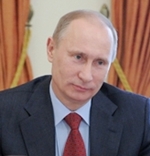Putin confident of Russian recovery in 2 years; blasts West
19 Dec 2014
 Russian President Vladimir Putin on Thursday admitted that plummeting oil prices and a free-falling rouble - which is the world's worst-performing currency - are reasons for concern, but said the economic crisis will pass.
Russian President Vladimir Putin on Thursday admitted that plummeting oil prices and a free-falling rouble - which is the world's worst-performing currency - are reasons for concern, but said the economic crisis will pass.
During his annual news conference from Moscow, he put two years as his outside guess for a Russian recovery, though he said he was hoping for a turnaround by the middle of 2015.
Putin declared that Russia will stand firm in the face of the Ukraine crisis and intensive Western pressure. He added that the West, especially the United States, remains locked into old Cold War rivalries and seeks to destroy his nation.
While his words had the usual political swagger, the usually confident and cocky-looking president reportedly looked a bit sheepish during this appearance. He spoke before a packed auditorium that included Russian and international journalists. Putin's eyes were often downcast, not challenging, during some statements and answers to questions.
In an interview with Vedomosti - a sister publication of London's Financial Times - economics minister Alexei Ulyukayev appeared to break from Putin's narrative on the economy, blaming the crisis entirely on the Russian government, or "delayed reforms and everything we did not do".
"We did this to ourselves," he told the newspaper.
The fact that oil prices have dropped from more than $110 a barrel to less than $60 in recent weeks is the immediate cause of the crisis, which has seen the value of the Russian currency halved.
Putin's opening remarks noted the failure of Russia to become more than a petro-state.
"We have failed in the past 20 years to diversify our economy," he admitted, referring to Russian history since the Soviet Union collapsed, which has relied almost completely on oil and gas revenue. Later he added, "Our economy will recover from this crisis. The question is when."
He praised the Russian Central Bank, saying it had taken the right steps in raising interest rates to 17 per cent this week, though he said its smart actions could have been a little quicker.
He appeared to blame Western powers for everything from the Chechen rebellion that began in 1994 to the diminished sheen of the Sochi Winter Olympics this year.
When asked whether, 25 years after the fall of the Berlin Wall, there was the risk of another wall being erected between East and West, he claimed that all Russia has wanted since the Berlin Wall fell is a Europe without divisions, and with peace, and Western powers have been unwilling to share this vision.
"We were told after the Berlin Wall that there would be no further expansion to the east," he said. "But there was expansion. Our partners did not stop building walls ... especially the United States."
He made these statements less than a year after seizing control of Crimea, Ukraine's Black Sea peninsula, and as a combination of Russian military and Russian-backed Ukrainian separatist forces continue to wage a war for independence in two south-eastern Ukrainian states, the Donetsk and Luhansk oblasts, collectively called Donbas.
Putin said Russian fighters in Ukraine weren't mercenaries, as they weren't being paid. Instead, he said, "they are following the call of their heart".
In answer to a question about Ukraine, Putin went on to say the crisis there needs a political - not a military, or even an economic - solution. In the past, he frequently has blamed what he calls the nationalist "Bandera" factions in Kiev threatening to return Nazi-style rule to Europe. Yet, in recent months, European newspapers have reported that Putin has been funding nationalist political parties throughout Europe, including the Front National in France, through Russian banks.
When asked whether this economic crisis might have its roots in the internationally unrecognised annexation of Crimea, Putin noted that international sanctions are responsible for about 25 per cent of the rouble's decline. Still, he said, it's wrong to draw that conclusion.
"This is not paying for Crimea," he said. "This is paying for our desire to remain an independent state."


















